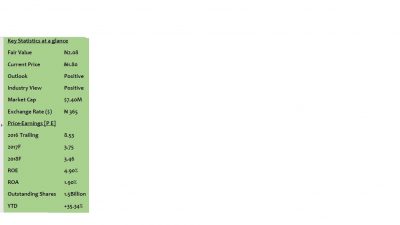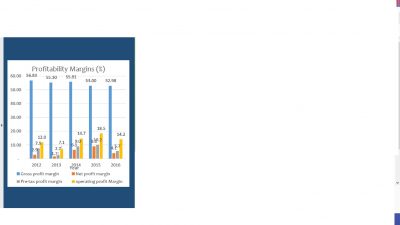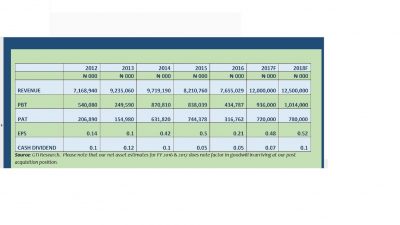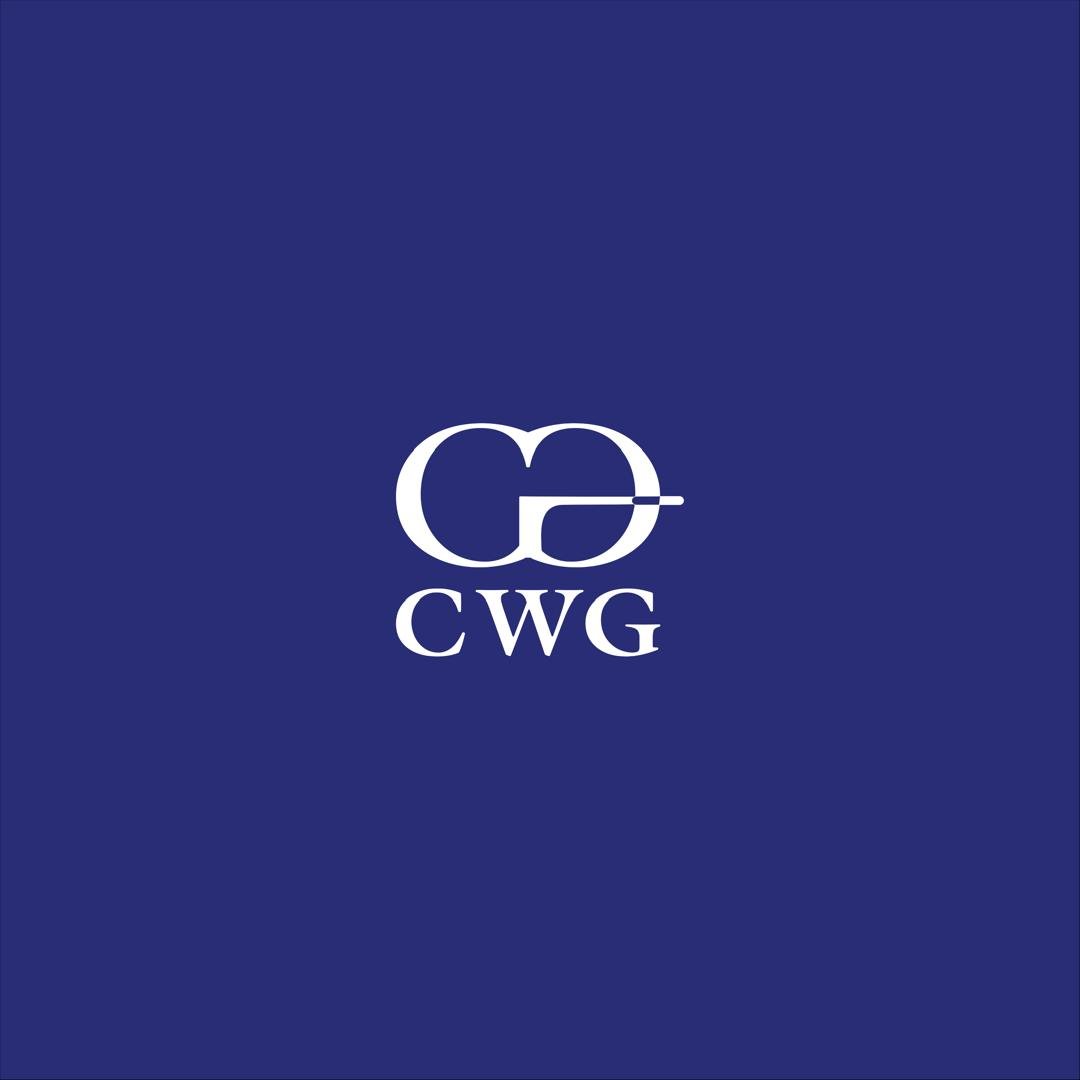HIGHLIGHT
Q1 -2017: Revenue rises by 181% and net income soars by 465%
Fidson healthcare PLC, a leading pharmaceutical manufacturing firm in Nigeria released its first quarter (Q1) result on April 28th, 2017.
The firm’s revenue grew by 181% from ₦1.2bn ($3.3m) in Q1 2016 to ₦3.4bn ($9.4bn) in Q1 2017. Cost of sales expanded by 191% from ₦570.4m ($1.6m) to ₦1.7bn ($4.83m). This increase was due to foreign exchange volatility.
In Addition, administrative expenses increased by 80% from ₦364m ($996,279) in Q1 2016 to ₦655m ($1.8m) in Q1 2017 while the firms selling and distribution expenses surged by 651% from ₦87million ($238,512) to ₦653m ($1.8m) as a result of sales expenses which grew by 5101% from ₦8.2million to ₦423.9million year on year in the first quarter. Despite this, there was improvement in PBT which rose by 465% from ₦41.9m ($114,737) in Q1 2016 to ₦236.7m ($648,570) in Q1 2017. Similarly, bottom line increased by 465% from ₦28.5m ($78,022) in Q1 2016 to ₦161m ($441,027) in Q2017.
The firm’s sharp increase in revenue was a result of the increase in the firm’s production capacity due to the commencement of operations in its new WHO compliant ultra-modern manufacturing. This has resulted in an expansion in sales volume of current production lines as well as introduction of new product lines consequently boosting revenue.
Another contributing factor was the recent implementation of the import adjustment tax (IAT), which has enhanced the competitive edge of local pharmaceutical producers compared with imported products. IAT is a 20% tariff on four categories of finished imported pharmaceutical products which local manufacturing firms have the capacity to produce. We believe that this policy will in addition to discouraging importation, stimulate local pharmaceutical production. IAT is an adjustment on the ECOWAS common external tariff (CET) in which imported finished pharmaceutical products into Nigeria attracts a zero percent tariff, while importing pharmaceutical raw materials and packaging materials attracts a 5%-20% tariff.
The firm’s gross profit margin shrank marginally from 53% from 52% between Q1 2016 and Q1 2017.
Net profit margin on the other hand expanded to 4.7% from 2.3% YoY as the firm was able to translate more money from revenue to net income in Q1 2017 than Q1 2016. ROA rose from 0.2% to 1% while ROE rose from 0.4% to 2.4% between Q1 2016 and Q1 2017 respectively.
On liquidity performance, the firm’s current ratio fell marginally from 0.59 to 0.57, indicative of short term working capital challenges. This position is further validated by its Quick ratio which declined from 5% to 2% and its net working capital which rose by 2.6% from a deficit of ₦2.7bn to ₦2.8bn between Q1 2016 and Q1 2017 respectively.
 of the stock and our expectation for FY 2016 to arrive at our fair value for the stock.
of the stock and our expectation for FY 2016 to arrive at our fair value for the stock.
Our fair value for the shares of Fidson Healthcare Plc was calculated using the Dividend Discount Model comprising our expected dividend estimate for the company and GTI Securities customized tweak to adjust for the risk
of investing in the Nigerian Health care sector. Our Required Rate of Return (RROR) factors in a risk premium of 11.15% and the yield for the most recently issued 20-Year FGN Bond was applied as the risk free rate of return.
FORECASTS
Our FY-2017 revenue forecast for Fidson Healthcare Plc is ₦12bn representing a 56.76% growth compared to the previous year. Our net income forecast for the firm is ₦720million representing a 127.3% growth yielding a forward EPS of 48 kobo.
We expect the revenue for FY-2017 to be higher than the previous year as a result of increased capacity utilization from its expansion drive, coupled with the newly implemented IAT tariff which is aimed at discouraging finished pharmaceutical products while encouraging local production.
We project input cost to grow YoY due to increased production activities as a result of its expansion. Similarly this trend will be replicated in its Administrative and selling & distribution expenses. Also, we are a bit concerned about the firm’s liquidity challenge which could stifle its bottom-line earnings. We therefore foresee an increase in the firm’s borrowings consequently increasing finance cost as the firm will try to bridge its liquidity deficit.
Despite these increases in its cost line, the firm has a history of efficiently managing its costs which we will begin to see from the second quarter through to the end of the year. This we believe will expand the bottom
line for the subsequent quarters and consequently the FY 2017 bottom line. Yet we are very cautious and believe the management efficiency will be key to achieving this.
The firm is a major player in the Nigerian healthcare industry, and with the Nigerian economy already on the way out of the recession, we believe the outlook of this company is positive.
DEVELOPMENTS
FIDSON COMMENCES OPERATIONS IN ITS BRAND NEW WHO COMPLAINT ULTRA-MODERN FACILITY
Fidson healthcare Plc. recently commenced operations in its brand new WHO compliant ultra-modern facility, capable of producing six (6) distinct product lines which include; (intravenous infusions and other sterile preparations, tablets, capsules, oral liquids, creams & ointments and dry powder) while also growing volumes in existing production lines.
INVESTMENT CONCLUSION/OUTLOOK FOR FIDSON HEALTHCARE PLC
The shares of Fidson Healthcare Plc. Is under-valued with focus on our FY 2017 estimates. The stock is currently trading at a 13.46% discount to our fair value estimate of N2.08.
The performance of the firm so far this year has been good as the firm achieved a 4.70% net profit margin, which was slightly double the 2.33% it achieved in Q1 2016. This is quite impressive as the economic challenges,
particularly the foreign exchange volatility which plagued the firm the previous year persisted through Q1 2017.
Despite this, we are optimistic about the firm’s prospects as its new manufacturing plant recently commenced operations. This is will be a huge boost to the firm as it will increase its local capacity. In addition, the
firm has built strategic relationships with various foreign bodies and firms to further spur its growth and help it achieve global recognition.
We believe that with the perceived recovery of the economy gaining traction and the commitment of the government in driving policies to ease the business environment to encourage local production the firm eventually begin to reap the benefits of its investments which will not only cement its leadership status in the healthcare space, but also boost the healthcare sector and Nigeria’s economy.
However, we have placed a HOLD recommendation on the shares of Fidson Healthcare. This is because the firm’s shares currently trading at ₦1.80 as at 18th May, 2017, is a 13.46 % discount to our fair value of N2.08.
We allege the value to be generated at this point as minimal and therefore recommend an entry price of ₦1.57 in order to get value from the firm’s shares.
In our analysis, Fair value is our opinion of the actual fundamental worth of a stock, irrespective of what the market is willing to pay for the stock.
A BUY rating from us in our opinion, prompts investors to purchase the stock guided by their risk appetite
A SELL rating from us in our opinion, prompts investors to exit the stock.
A HOLD rating from us in our opinion, prompts investors to desist from buying the stock if they do not already have the
stock, and not sell if they already have the stock.
Recommendation: HOLD
GTI Securities Research
Coverage Analyst: Fejiro Emagurehor
f.emagurehor@gti.com.ng
Lead Analyst: Chuks Anyanwu
c.anyanwu@gti.com.ng
NSE Symbol: FIDSON
Listed on the Nigerian Stock Exchange














